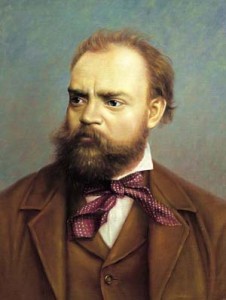Platt, Boca Symphonia glorious in Dvorak rarity
 The Boca Raton Symphonia introduced Dvorak’s Symphony No. 5 in what may well be its belated South Florida premiere, Sunday at the attractive Roberts Theater at Saint Andrew’s School. The Symphonia is easily one of the best ensembles to arise in this area during the past several years, and the orchestra’s enterprising conductor Alexander Platt let the music pour forth to reveal a worthy discovery from the pen of this great composer.
The Boca Raton Symphonia introduced Dvorak’s Symphony No. 5 in what may well be its belated South Florida premiere, Sunday at the attractive Roberts Theater at Saint Andrew’s School. The Symphonia is easily one of the best ensembles to arise in this area during the past several years, and the orchestra’s enterprising conductor Alexander Platt let the music pour forth to reveal a worthy discovery from the pen of this great composer.
 Dvorak wrote nine symphonies, yet until the discovery of four early unpublished works almost fifty years ago, most people thought of his “New World” symphony as number “5.” The old numbering was corrected for all his symphonies, and that famous piece became number nine. And while the last three symphonies get frequent outings, numbers five and six are rarely heard in concert, and the first four of his essays in the genre remain largely forgotten.
Dvorak wrote nine symphonies, yet until the discovery of four early unpublished works almost fifty years ago, most people thought of his “New World” symphony as number “5.” The old numbering was corrected for all his symphonies, and that famous piece became number nine. And while the last three symphonies get frequent outings, numbers five and six are rarely heard in concert, and the first four of his essays in the genre remain largely forgotten.
The description “Pastoral” was assigned by the publisher to Dvorak’s Fifth Symphony, and it’s a reasonably apt description for the first two movements. More important, Dvorak finally freed himself from all traces of Wagnerian influence.
The Boca orchestra sounded glorious, and Platt inspired his ensemble to play with spontaneity, rhythmic exactitude, and spot-on intonation. The brass and winds were especially impressive, and the strings, while limited in number, rose to the occasion as well, sounding full and rich in texture. Platt’s Slavic heritage made the scherzo a movement of great joy as he phrased the composer’s dance-like music with loving care and affection.
Further interest in the program was generated by the appearance of Benjamin Britten’s last orchestral composition. The Suite on English Folk Tunes takes its subtitle, “A Time There Was,” from a poem by Thomas Hardy, which looks back on happier times. Although the five-movement suite makes use of much folk source material, the melodies are treated in a serious manner, and without the rambunctious usually reserved for such pieces. Movements ranged from the pithy and sardonic, to the quite lovely expression of sadness. The colorful and virtuosic orchestration was played with great spirit and tenderness by the ensemble and Platt responded to the many gearshifts while retaining attentive balances and total control over a huge dynamic range.
 Mendelssohn’s Piano Concerto No. 1 was the only piece on the program that could be called a standard. Platt’s friend and Connecticut neighbor Frederic Chiu proved to be a wonderful advocate for this always-fresh music. His phrasing and delicacy were perfect for the light-textured music, and he held the climaxes in reserve instead of pushing them to the limit. Once again Platt and the orchestra kept things under control and in balance for a performance of vernal beauty.
Mendelssohn’s Piano Concerto No. 1 was the only piece on the program that could be called a standard. Platt’s friend and Connecticut neighbor Frederic Chiu proved to be a wonderful advocate for this always-fresh music. His phrasing and delicacy were perfect for the light-textured music, and he held the climaxes in reserve instead of pushing them to the limit. Once again Platt and the orchestra kept things under control and in balance for a performance of vernal beauty.
Posted in Performances
Leave a Comment
Mon Jan 12, 2009
at 1:46 pm
No Comments








